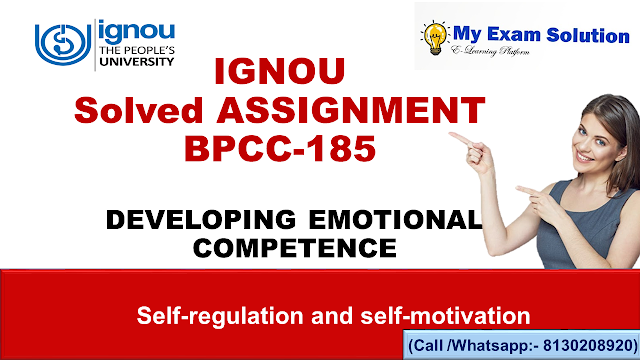Self-regulation and self-motivation
Self-regulation and self-motivation are two key components of emotional intelligence that play a crucial role in our personal and professional lives.
They are essential skills for managing our emotions, thoughts, and behaviors effectively, as well as for achieving our goals and maintaining a sense of well-being.
Self-regulation and self-motivation-Explore
the concepts of self-regulation and self-motivation, their importance, and strategies
for developing and enhancing these skills.
Self-Regulation: Self-regulation refers to the ability to manage and
control our emotions, impulses, and behaviors in different situations. It
involves being aware of our emotions, understanding their impact on our
thoughts and actions, and choosing appropriate responses. Self-regulation
allows us to handle stress, frustration, and setbacks in a constructive manner,
without letting our emotions overpower us.
Importance
of Self-Regulation: Self-regulation is crucial for
several
reasons:
1. Emotional Well-being: When we have effective self-regulation skills, we can
manage our emotions in a healthy and balanced way. Instead of reacting
impulsively or being overwhelmed by negative emotions, we can respond
thoughtfully and calmly. This promotes emotional well-being and reduces the
risk of stress-related issues.
2. Interpersonal Relationships: Self-regulation plays a vital role
in our interactions with others. By regulating our emotions and behaviors, we
can avoid impulsive and hurtful responses, and instead engage in more
empathetic and considerate communication. This contributes to healthier and
more satisfying relationships.
Also Read-
3. Decision-Making: Self-regulation enhances our ability to make rational
and informed decisions. By managing our emotions and staying focused, we can
avoid making impulsive or irrational choices. We can evaluate situations
objectively and weigh the pros and cons before taking action.
Strategies
for Developing Self-Regulation: Developing self-
regulation skills requires practice and self-awareness.
Here are
some
strategies to enhance self-regulation:
1. Mindfulness: Practicing mindfulness can help us become more aware
of our thoughts, emotions, and bodily sensations in the present moment. This
awareness enables us to observe our reactions without judgment and make
conscious choices about how to respond.
2. Emotional Awareness: Develop an understanding of your own emotions and the
triggers that lead to certain emotional responses. Notice patterns in your
emotional reactions and explore healthier ways to manage them.
3. Pause and Reflect: Instead of immediately reacting to a situation, take
a moment to pause and reflect. This allows you to respond in a more thoughtful
and intentional manner, rather than being driven by impulsive emotions.
4. Stress Management: Engage in stress-reducing activities such as
exercise, deep breathing, meditation, or engaging hobbies. By managing stress
effectively, you can prevent it from overwhelming your emotions and impairing
your ability to self-regulate.
5. Cognitive Restructuring: Challenge negative thought
patterns and replace them with more positive and constructive thoughts. This
helps in reframing situations and reducing emotional reactivity.
6. Self-Motivation: Self-motivation refers to the ability to initiate and
sustain our own drive, enthusiasm, and commitment towards achieving goals. It
involves setting meaningful goals, maintaining focus and perseverance, and
taking proactive steps to achieve them, even in the face of obstacles and
setbacks.
Importance
of Self-Motivation: Self-motivation is essential for
personal
and professional success:
1. Goal Achievement: Self-motivation provides the drive and determination
needed to set and work towards goals. It helps us overcome challenges, stay
focused, and persist in the face of difficulties, increasing the likelihood of
achieving our desired outcomes.
2. Productivity and Performance: When we are self-motivated, we
tend to be more productive and perform better. We are driven by intrinsic
motivation, which stems from personal interest and satisfaction, rather than
relying solely on external rewards or pressure.
3. Resilience: Self-motivation contributes to resilience—the ability
to bounce back from setbacks and failures. It helps us maintain a positive
mindset, learn from our mistakes, and keep moving forward, even when faced with
obstacles.
4. Strategies for Developing Self-Motivation: Developing
self-motivation requires cultivating a positive mindset and adopting strategies
to maintain motivation. Here are some approaches to enhance self-motivation:
5. Set Meaningful Goals: Establish clear and meaningful goals that align with
your values and aspirations. Break them down into smaller, achievable steps and
track your progress. Celebrate milestones along the way to maintain motivation.
6. Find Intrinsic Motivation: Identify the intrinsic motivations
behind your goals. Understand why they are important to you and how they
connect to your values and personal growth. Focusing on intrinsic motivators,
such as a sense of fulfillment or personal growth, can help sustain motivation.
7. Create a Supportive Environment: Surround yourself with individuals
who support and encourage your goals. Seek out mentors or role models who can
inspire and guide you. Additionally, design your physical environment to be
conducive to productivity and motivation.
8. Positive Self-Talk: Develop positive self-talk and affirmations to
reinforce your belief in your abilities. Replace self-doubt and negative
thoughts with empowering and encouraging statements. Visualize yourself
achieving your goals to strengthen your motivation.
9. Break tasks into manageable chunks: When facing a large or
challenging task, break it down into smaller, more manageable parts. This helps
to prevent overwhelm and allows you to focus on one step at a time, maintaining
motivation as you make progress.
Self-regulation and self-motivation are vital components of emotional intelligence that contribute to personal growth, well-being, and success. By developing self-regulation skills, we can effectively manage our emotions and behaviors.
Self-regulation and self-motivation-Through self-motivation, we can
set meaningful goals, maintain focus, and persevere towards achievement. By
cultivating these skills, we can navigate challenges, enhance our overall
performance, and lead more fulfilling lives.







0 comments:
Note: Only a member of this blog may post a comment.